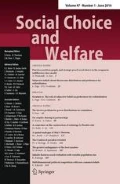Abstract
We show how computational complexity might protect the integrity of social choice. We exhibit a voting rule that efficiently computes winners but is computationally resistant to strategic manipulation. It is NP-complete for a manipulative voter to determine how to exploit knowledge of the preferences of others. In contrast, many standard voting schemes can be manipulated with only polynomial computational effort.
Similar content being viewed by others
References
Bartholdi JJ III, Tovey CA, Trick MA (1989) Voting schemes for which it can be difficult to tell who won the election. Soc Choice Welfare 6: 157–165
Bartholdi JJ III, Tovey CA, Trick MA (1987) How hard is it to control an election? Econometrica (submitted)
Bollobas, B (1979) Graph theory. Graduate Texts 63. Springer, Berlin Heidelberg New York
Gardenfors P (1976) Manipulation of social choice functions. J Econ Theory 13:217–228
Garey M, Johnson D (1979) Computers and intractability: a guide to the theory of NP-completeness. WH Freeman, San Francisco
Gibbard A (1973) Manipulation of voting schemes. Econometrica 41:587–601
Gottinger HW (1987) Choice and complexity. Math Soc Sci 14:1–17
Kazic B, Keene RD, Lim KA (eds) (1986) The official laws of chess. Maxmillan, New York
Lewis A (1985) On the effectively computable realizations of choice functions. Math Soc Sci 10: 43–80
Morrison M (ed) (1978) Official rules of chess, 2nd Edn. David McKay, New York
Niemi RG, Riker WH (1976) The choice of voting systems. Sci Am 234:21–27
Nurmi H (1983) Voting procedures: a summary analysis. Br J Polit Sci 13:181–208
Nurmi H (1986) Problems of finding optimal voting and representation systems. E J Oper Res 24:91–98
Satterthwaite MA (1975) Strategy-proofness and Arrow's conditions. J Econ Theory 10:187–217
Stearns R (1959) The voting problem. Am Math Mon 66:761–763
Tovey CA (1984) A simplified NP-complete satisfiability problem. Disc Appl Math 8:85–89
Author information
Authors and Affiliations
Additional information
The authors appreciate many helpful comments and suggestions by the editor and three anonymous referees. We also thank Michel Balinski, Salvador Barbera, Jean-Pierre Barthelemy, and Peyton Young for stimulating discussions.
Rights and permissions
About this article
Cite this article
Bartholdi, J.J., Tovey, C.A. & Trick, M.A. The computational difficulty of manipulating an election. Soc Choice Welfare 6, 227–241 (1989). https://doi.org/10.1007/BF00295861
Received:
Accepted:
Issue Date:
DOI: https://doi.org/10.1007/BF00295861


